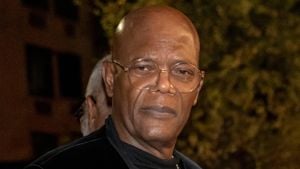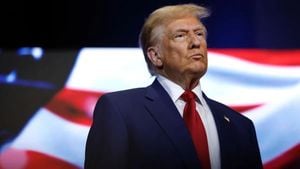Sean “Diddy” Combs, the renowned hip-hop mogul, has found himself behind bars yet again, as his bail request was denied for the third time by U.S. District Judge Arun Subramanian. The judge's decision, delivered on November 27, reflects serious concerns over Diddy's potential for witness tampering amid the pressing sex trafficking and racketeering charges he faces.
The courtroom drama unfolded as Combs' legal team sought to secure his release with proposals for a $50 million bail package. This proposal included provisions for full-time security monitoring, home detention, and restrictions on communications with anyone outside his legal representatives. Despite these measures, Judge Subramanian's ruling emphasized the inadequacy of such conditions to guarantee community safety.
Prosecutors asserted compelling evidence of Diddy's propensity for violence and witness tampering. They accused him of attempting to manipulate prospective witnesses from the Metropolitan Detention Center, exerting influence over narratives aimed at swaying public opinion and perhaps even potential jurors. Notably, the court pointed to incidents where Combs allegedly contacted witnesses even after he had provided grand jury testimony back in June.
The judge's alignment with the prosecution's stance was clear: "No condition or combination of conditions will reasonably assure the safety of the community," he stated. He substantiated this by highlighting evidence of Diddy's violations of Bureau of Prisons regulations during his incarceration—a clear indication of his willingness to circumvent rules even when under close watch.
Reports suggest the rapper had orchestrated prison communications which involved paying fellow inmates to make calls to individuals outside of his approved contact list. This included involving family and defense attorneys through three-way calls to throw off monitoring efforts. Such actions were considered strong evidence for the court to deny bail.
Notably, Diddy remains adamant about his innocence, pleading not guilty to all the allegations laid against him, which include serious counts like racketeering and transportation for prostitution, along with multiple sexual assault claims involving numerous victims—some of whom were underage at the time of the alleged violations.
It's worth noting this significant legal condition did not come unexpectedly. The series of bail denials stemmed from previous hearings, where similar fears about witness safety and obstruction of justice had been raised. Both prosecutors and jurors were evidently rattled by the potential for Combs to influence testimonies or intimidate individuals slated to testify against him.
Combs' legal representatives, meanwhile, maintained their stance through multiple appeals, arguing the need for their client to prepare effectively for his upcoming trial scheduled for May 2025, far from the confines of prison. They reiterated concerns over the lawfulness of the seizure of documents, claiming they were covered under attorney-client privilege. Contrarily, the prosecution cited these actions as part of Combs's alleged attempt to obstruct justice.
Further complicacy lies within the intricacies of social media influence. Combs was accused of using platforms to launch campaigns for media defense, allegedly orchestrated by family members who posted celebratory videos around Combs' recent birthday as part of this strategy. It seems not just the courtroom but the digital space has also become central to the narrative surrounding his legal predicaments.
Outside the legalities, social media and public sentiment continue to swirl. Notable figures—including alleged victims and advocates—are following the case closely, calling attention to the broader issues of justice, accountability, and the power dynamic at play within celebrity culture. Amidst this complex narrative are questions of not only Diddy’s fate but also those of the many individuals whose lives intersect with the high-profile trial.
The accusations against Combs are severe, depicting troubling patterns of behavior and attitudes alleged from prior dealings. With three denials already and the criminal trial approaching, the stakes are towering for the music mogul.
To conclude, as the case edges closer to trial, both public and legal scrutiny surrounds Sean Combs. The question of what lies next for “Diddy” remains part of larger dialogues about accountability, victimization, and the shadows cast by fame and fortune. The court's refusal to grant him bail signals rather decisively the seriousness of the accusations, which go far beyond simple misconduct—navigated through complex legal and moral landscapes.



